Find family drama, romance and heartbreak in our eclectic September reads – plus enjoy a talk from a giant of Irish literature
Words by Charlotte Griffiths
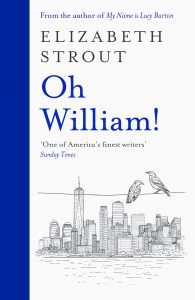 Oh William! by Elizabeth Strout
Oh William! by Elizabeth Strout
Opening a new Elizabeth Strout book is like stepping into a warm bath at the end of a hard day. You can surrender your attention, safe in the knowledge that you’ll be taken by the hand and shown what good writing looks like. Oh William! is no exception to this rule, giving readers another chance to spend time in the company of Lucy Barton, Strout’s unconventional heroine with a knack for highlighting both the pain and beauty of existence with her off-hand observations on life, love and loss. The writing seems so easy – almost sparse – but that skill of knowing what to leave unsaid is where her power truly lies. The book shines in the confident gaps around the words – those rests in conversation between Lucy and her second husband (the William of the book’s title); the quiet thoughts where the pair reflect on what they’ve just learned about each other; or the stunned silences as long-held family secrets unfurl. It’s a beautifully satisfying portrait of a long marriage, and the love and respect two people can hold for each other – even after vows are broken and children are grown. No one writes quite like Elizabeth Strout – if you’ve read the others in the Lucy Barton series, this exquisitely crafted book is a genuine must-read. And if this is your first encounter with a truly unforgettable character, I strongly recommend seeking out the others as swiftly as possible.
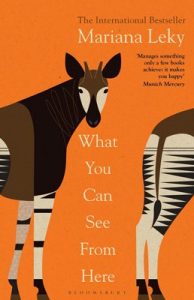 What You Can See From Here by Mariana Leky
What You Can See From Here by Mariana Leky
After a long wait, this international bestseller has finally been translated from German and released in English. Set in a small rural village in West Germany, the book opens with the news that Selma has dreamed of an okapim, meaning one of the community will die in the next 24 hours. Selma’s ten-year-old granddaughter, Luisa, introduces us to an ensemble cast of unforgettable characters: from the optician who has spent his life silently adoring Luisa’s grandmother, to her hard-working mother and father, and her very best friend Martin. All are introduced within anecdotes and village legends, shared in that overly familiar way where the speaker assumes you’re already aware of the parties involved – and since asking for clarification would slow the pace of the excellent story, you nod along and encourage them to continue, constructing fully rounded people from these shards of stories as you go. Packed with diversions, hilarious set pieces and hand-to-mouth tragedies, this cheerfully intimate book is a treat – an immersive, semi-surrealist experience that features (amongst many things) a monk from Japan, a Little Women-style romantic walk in the rain, and an excellent dog called Alaska. It is far-fetched in precisely the way that real life is, and as with the best stories, sometimes you simply had to be there – and this book allows you to do just that.
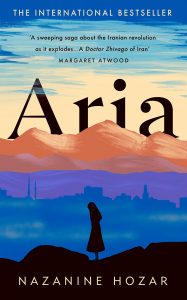 Aria by Azanine Hozar
Aria by Azanine Hozar
This debut novel immerses us in the Iranian revolution through the eyes of Aria: a motherless girl found in an alleyway in Tehran as a baby. She makes her way through life with three different women, each with unique attitudes to the child entrusted to their care, beginning with Behrouz (the man who discovered her) and Zahra, his abusive and apparently disinterested wife. An eye injury caused by neglect then leads her to the lavish home of Fereshteh, a wealthy woman with no children. She sees potential in the child, sending Aria to school and forcing her to visit the home of Mehri, an impoverished woman, to give her daughters reading lessons and learn about privilege at the same time. A heady yet well-handled blend of the personal and political, Aria gives readers a fascinating insight into life in Iran between the 1950s and the late 1970s. As the young woman grows up and moves between households, she encounters people who will become Revolutionary Guards, and those who’ll turn to communism, all while learning more about her heritage, uncovering the truth of her past and falling in love. This cinematic saga was one of two books selected by the Rare Birds Book Club, a service designed to help people read for fun. Each month, subscribers choose between two novels, one of which then arrives in the post, beautifully wrapped and ready for your literary enjoyment.
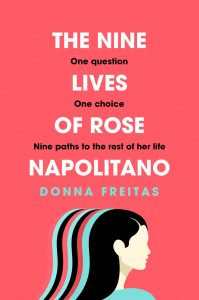 The Nine Lives of Rose Napolitano by Donna Freitas
The Nine Lives of Rose Napolitano by Donna Freitas
If you’ve ever wondered whether or not to have children, attempted and heartbreakingly failed, avoided it but become pregnant accidentally – or indeed chosen not to have children and then desperately wanted them – then this, the brilliant debut novel from writer Donna Freitas, is for you.
The book follows Rose Napolitano, a resolutely child-free professor, as her photographer-husband Luke – having previously agreed to a child-free life – changes his mind, and decides he does want to have kids with Rose. Her multiple lives diverge during an argument over prenatal vitamins, and different paths unfurl from that point. Each chapter announces which life you’re experiencing, but every single one of her existences is packed with emotion, heart-wrenching sacrifice and compromise, love, grief and meaning. Rose encounters similar challenges in each of the tales, whether she decides to have children or not, and there are key figures who find their ways into her worlds via different doors, depending on the life you’re reading. It’s easy to forget the specifics of each situation, but you can surrender to the joy of letting the chapters wash over you. As this book powerfully illustrates, there are many, many routes to achieving a meaningful existence, and there are no right choices – only consequences.
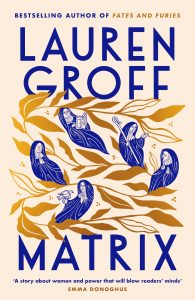 Matrix by Lauren Groff
Matrix by Lauren Groff
I came to this extraordinary book knowing nothing about it, except that I’d adored both Fates and Furies and Florida, but the first few pages made me wonder if my Kindle had downloaded the wrong file. Lauren Groff is normally associated with contemporary fiction, but this book is set in 12th-century France and England, following Marie de France, a 17-year-old outcast whose blood connection with the throne sees her banished to a life running a failing, backwater convent. Marie shuts out the unfriendly world, heartbroken by the cruel loss of her lovers at court, but over time – thanks to her furious ambition and childhood experiences with the powerful, confident women of her family – she turns the convent’s fortunes around, attracting novices from far and wide. It soon seems these women can accomplish anything when freed from the expectations of society, and the burden of child-rearing. As Marie observes early in her training: “…women in this world are vulnerable: only reputation can keep them from being crushed”. So she builds a psychological fortress around her nuns, and the physical barrier of an impenetrable labyrinth, to help keep the world at bay. But with success comes greedy eyes and their associated dangers – can the sisters reach too far? Can they remain an island forever? An adventurous tale of love – both spiritual and secular – passion, community and devotion that will leave you stunned at Groff’s creative vision. And wondering where we might find a similar community to move to…
Literary star comes to town
Presenting his new book The Magician, Irish novelist, poet and critic Colm Tóibín is back in the city for a special Cambridge Literary Festival event on 29 September. The book tells the story of troubled novelist Thomas Mann, offering an ambitiously sweeping story of unrequited love, exile, war and family, which takes the reader from the turn of the century through both world wars. Catch Colm in conversation with writer and broadcaster Alex Clark at the Cambridge Union.

